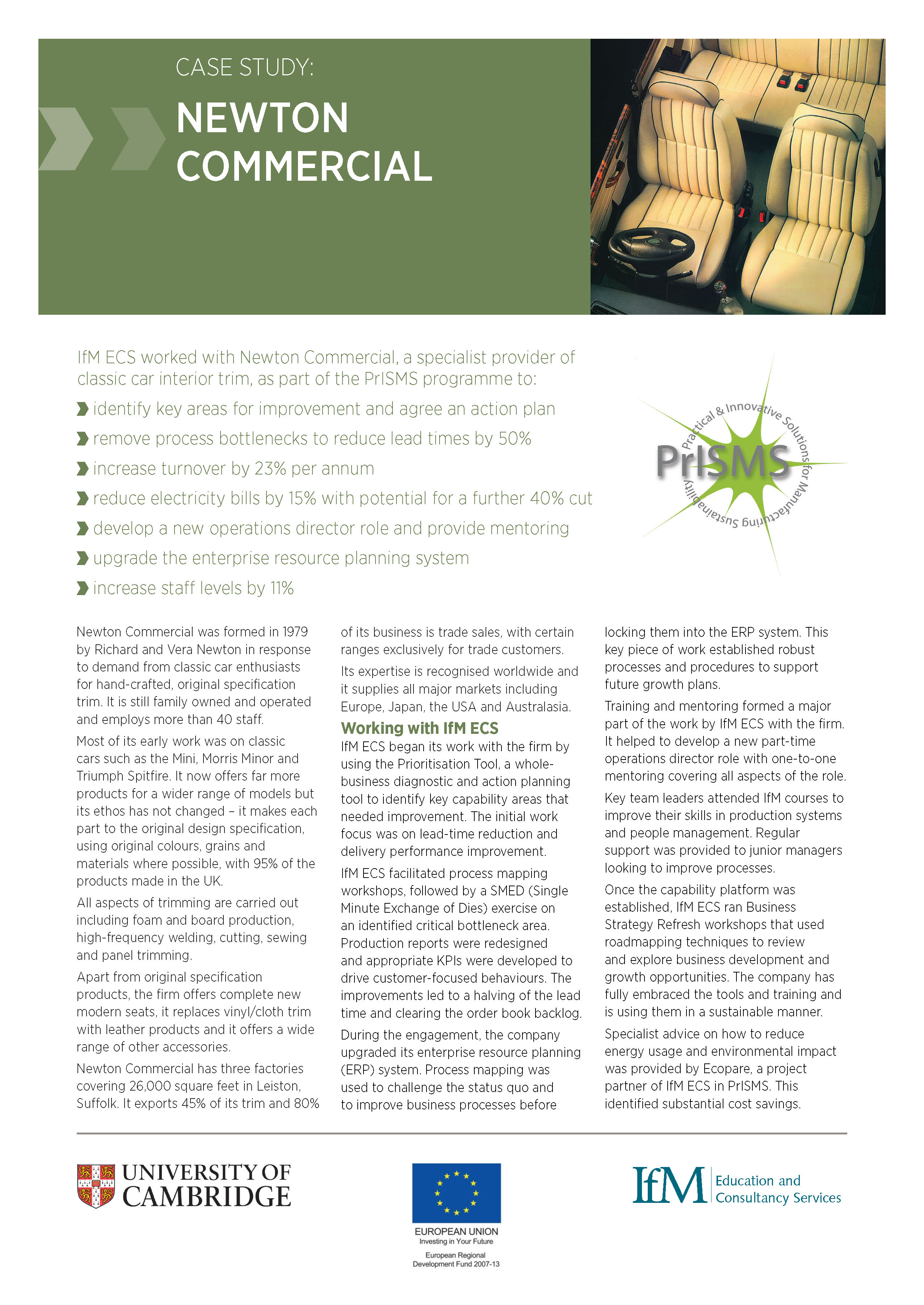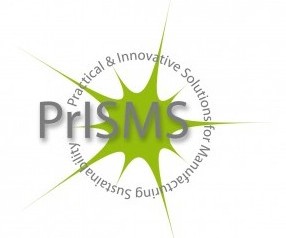Newton Commercial: in the driving seat in the classic car market

Newton Commercial is one of more than 100 smaller manufacturers that IfM ECS is working with as part of the PrISMS programme – and this case study highlights the difference it has made. The company is a leading supplier of original specification interior trim for a range of classic cars such as the Mini, making each part to the original design. It supplies markets worldwide, as well as offering new modern seats, trim and other accessories.
IfM ECS worked with Newton Commercial as part of the PrISMS programme to:
|
identify key areas for improvement and agree an action plan |
|
|
remove process bottlenecks to reduce lead times by 50% |
|
|
increase turnover by 23% per annum |
|
|
reduce electricity bills by 15% with potential for a further 40% cut |
|
|
develop a new operations director role and provide mentoring |
|
|
upgrade the enterprise resource planning system |
|
|
increase staff levels by 11%. |

Newton Commercial was formed in 1979 by Richard and Vera Newton in response to demand from classic car enthusiasts for hand-crafted, original specification trim. It is still family owned and operated and employs more than 40 staff.
Most of its early work was on classic cars such as the Mini, Morris Minor and Triumph Spitfire. It now offers far more products for a wider range of models but its ethos has not changed – it makes each part to the original design specification, using original colours, grains and materials where possible, with 95% of the products made in the UK.
All aspects of trimming are carried out including foam and board production, high-frequency welding, cutting, sewing and panel trimming. Apart from original specification products, the firm offers complete new modern seats, it replaces vinyl/cloth trim with leather products and it offers a wide range of other accessories.
Newton Commercial has three factories covering 26,000 square feet in Leiston, Suffolk. It exports 45% of its trim and 80% of its business is trade sales, with certain ranges exclusively for trade customers.
Its expertise is recognised worldwide and it supplies all major markets including Europe, Japan, the USA and Australasia.

Working with IfM ECS
IfM ECS began its work with the firm by using the Prioritisation Tool, a whole-business diagnostic and action planning tool to identify key capability areas that needed improvement. The initial work focus was on lead-time reduction and delivery performance improvement.
IfM ECS facilitated process mapping workshops, followed by a SMED (Single Minute Exchange of Dies) exercise on an identified critical bottleneck area. Production reports were redesigned and appropriate KPIs were developed to drive customer-focused behaviours. The improvements led to a halving of the lead time and clearing the order book backlog.
During the engagement, the company upgraded its enterprise resource planning (ERP) system. Process mapping was used to challenge the status quo and to improve business processes before locking them into the ERP system. This key piece of work established robust processes and procedures to support future growth plans.
Training and mentoring formed a major part of the work by IfM ECS with the firm. It helped to develop a new part-time operations director role with one-to-one mentoring covering all aspects of the role. Key team leaders attended IfM courses to improve their skills in production systems and people management. Regular support was provided to junior managers looking to improve processes.
Once the capability platform was established, IfM ECS ran Business Strategy Refresh workshops that used roadmapping techniques to review and explore business development and growth opportunities. The company has fully embraced the tools and training and is using them in a sustainable manner.
Specialist advice on how to reduce energy usage and environmental impact was provided by Ecopare, a project partner of IfM ECS in PrISMS. This identified substantial cost savings.
Lower lead time boosts growth
IfM ECS worked closely with the firm to identify key areas for improvements, particularly reducing lead times and improving delivery performance. These interventions, and the results they have brought about, are detailed below.
|
Reducing lead times: Process mapping workshops were facilitated and an exercise was carried out on an identified bottleneck area. This led to a halving of the lead time from six weeks to three weeks, as well as clearing the order book backlog |
|
|
Financial improvements: Turnover has increased by 23% per annum |
|
|
Sales growth: Due in part to the marked reduction in the lead time at Newton Commercial, one of its US clients has seen its sales rise by 50% |
|
|
Jobs created: Staff levels have risen from 38 in January 2013 to 42 in October 2014, an increase of 11% |
|
|
New operations director position: There was extensive one-to-one mentoring covering all aspects of the role, helping the operations director to maintain her work-life balance while continuing her key contribution to the capability development projects |
|
|
Staff training: Two IfM courses held in the workplace helped key team leaders improve skills in production systems and people management while follow-up mentoring ensured this training yielded maximum benefits |
|
|
Support for junior managers: Ongoing mentoring helped staff to improve particular processes. They are taking on project improvement work as a result of more streamlined day-to-day processes. Team leaders now make more informed decisions on priorities |
|
|
Upgrading the enterprise resource planning system: This was updated and process mapping helped improve sales order processing and product despatch. This established robust processes and procedures to support future growth |
|
|
Culture change: The company has fully embraced the tools, techniques and training in a sustainable manner – processes have improved, the firm is self-sufficient in process mapping, staff are better able to deal with changes and the managing director can focus on developing the business |
|
|
Business strategy refresh: Workshops employed roadmapping techniques to review and explore business development and growth opportunities |
|
|
Energy savings: Working with Ecopare helped the firm to reduce its electricity usage and bills by 15% and identify a potential further 40% reduction. |
Jonny Newton, managing director, and Katie Newton, operations director, said: “Our main goal was to reduce our lead time from six weeks. We are currently working to a three-week lead time and we have seen an increase in sales.
“IfM ECS has been excellent in mentoring our staff in challenging factory situations. Staff have benefited from several training courses and what works really well are the follow-up meetings with the team in the factory. Our management team is better equipped due to some basic changes introduced and our processes have improved tenfold.
“IfM ECS has been first class in its approach in helping our business grow, giving us clarity in difficult situations and good practical advice on the production floor and in the boardroom.”
For more on Newton Commercial visit www.newtoncomm.co.uk.
|
PrISMS The PrISMS (Practical & Innovative Solutions for Manufacturing Sustainability) programme aims to transform the growth prospects of 50 start-ups and 70 smaller manufacturers across the Eastern Region – creating more than 140 new jobs and safeguarding many more. The programme is funded by the European Regional Development Fund (ERDF), with match funding from the EPSRC Centre for Innovative Manufacturing in Industrial Sustainability, ideaSpace and IfM Education and Consultancy Services (IfM ECS) and supported by 11 county and district councils in the region. It is managed and delivered by IfM ECS, which bases its methods on research at the University of Cambridge’s Institute for Manufacturing (IfM). For more information visit here. |
|
IfM ECS IfM Education and Consultancy Services works with companies of all sizes to help create and capture value and with national and regional governments to support and grow their industrial sectors. It does this by transferring the new ideas and approaches developed by researchers at the Institute for Manufacturing (IfM) through a programme of education and consultancy services. IfM ECS is owned by the University of Cambridge. Its profits are gifted to the University to fund future research activities. For more details on its work with SMEs visit here. |
|
ERDF PrISMS is part-financed by the East of England European Regional Development Fund (ERDF) Programme 2007-2013. The Department for Communities and Local Government is the managing authority for ERDF in England, which is one of the funds established by the European Commission to help local areas stimulate their local development by investing in projects which will support local businesses and create jobs. The East of England ERDF programme (covering Bedfordshire, Cambridgeshire, Essex, Hertfordshire, Norfolk and Suffolk) supports low carbon economic growth and has allocated approximately €95 million. |
Download the case study here.
For further information about the work of IfM ECS in the PrISMS programme please contact contact Nicky Athanassopoulou on +44 (0)1223 760376 or naa14@cam.ac.uk; or John McManus on +44 (0) 1223 764908 or jm694@cam.ac.uk.









